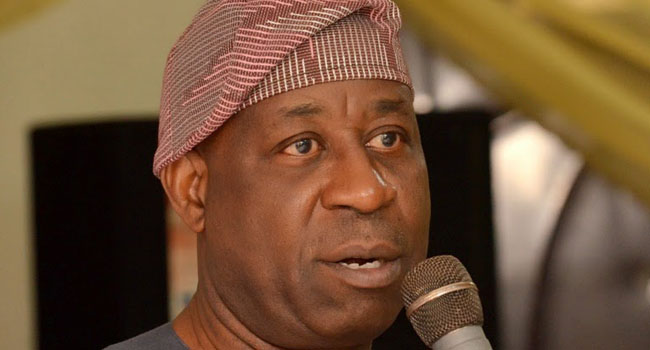The Federal Government has arrested 300 illegal miners nationwide as part of its efforts to revitalize Nigeria’s mining sector.
This was disclosed during a strategic briefing held by the House Committee on Solid Minerals during its oversight visit to the Minister of Solid Minerals Development, Dr. Dele Alake, at the ministry’s headquarters in Abuja on Thursday.
During the visit, Dr. Alake outlined a series of transformative initiatives aimed at rejuvenating the mining sector.
Emphasizing the ministry’s 7-point agenda, he highlighted advancements in securing mining operations, curbing illegal activities, and positioning the sector as a key driver of economic growth.
The statement read in part, “At the forefront of this transformation is a strengthened security framework designed to combat illegal mining—a longstanding challenge that has threatened both local communities and Nigeria’s global standing. Since deploying over 2,000 trained mine marshals, nearly 300 illegal operators, including foreign nationals, have been apprehended, significantly reducing unauthorized mining activity across the nation.”
The minister credited the progress to the proactive support of President Bola Tinubu, which has enabled an effective inter-ministerial collaboration with the Ministry of Interior, ensuring swift deployment of resources and personnel to protect mining regions.
“This renewed security architecture is already having a profound impact,” Dr. Alake noted, describing the positive shift brought by reduced illegal operations. “Our commitment to safeguarding our mining sites is also a commitment to Nigeria’s stability and an invitation to investors who seek reliable partnerships,” he said.
In addition to strengthening security, Dr Alake shared the ministry’s vision for establishing Nigeria as a global mineral hub.
According to him, targeted outreach efforts have successfully attracted the interest of leading international investors, positioning Nigeria’s mineral sector for future partnerships that promise mutual growth.
“The strategic focus on in-country processing and value addition for minerals is helping Nigeria retain wealth that might otherwise be lost through raw exports. This policy is also setting a trend across Africa, culminating in the creation of the African Mineral Strategy Group.”
With revenue on the rise and global interest growing, Nigeria’s solid minerals sector is gaining recognition as a driver of sustainable development.
Dr Alake expressed gratitude for the ongoing support from Nigeria’s legislative authorities and other key partners, emphasising that these combined efforts are building a resilient foundation for the sector.
“We’re setting Nigeria’s mineral wealth on a path to growth, resilience, and international respect,” he stated, adding with a smile, “But like Oliver Twist, we ask for more. We look forward to even stronger collaboration to achieve greater milestones.”
The minister expressed optimism that with these reforms setting the stage for substantial economic contributions, Nigeria’s mining sector is on a trajectory to significantly bolster the nation’s Gross Domestic Product.
In his remarks, the Chairman of the House Committee on Solid Minerals Development, Hon. Garza Gbefwi, said the House Committee on Solid Minerals Development remained dedicated to advancing transparency, growth, and robust support for this sector.
“Throughout, the Committee has maintained a clear distinction between legislative and executive roles, allowing the Ministry to shape and implement its policies without interference, he said.
He noted that this year, the group has adopted a more hands-on approach by engaging directly with each agency under the Ministry’s oversight.
These engagements, he explained, have offered crucial insights into both achievements and challenges in the sector, with particular focus on key agencies like the Nigerian Geological Survey Agency (NGSA) and the Solid Minerals Development Fund (SMDF). The aim is to remove any barriers hindering sectoral progress.
The chairman highlighted that one of the primary challenges facing the NGSA is limited funding, which constrains its core responsibility of generating geological data.
Mineral exploration is capital-intensive, and adequate financing is essential to produce reliable data that will propel the sector forward.
He advocated for increased funding to enable effective collaboration between the NGSA and SMDF, empowering both agencies to drive sectoral growth.
Recognizing the solid minerals sector’s economic significance, Hon. Gbefwi urged the Federal Government to prioritize funding for its development.
He encouraged the ministry to work closely with the president and key stakeholders to secure resources that will ensure the sector’s long-term sustainability and impact.
On licensing and consent issues, the chairman emphasized the importance of careful handling of exploration and extraction licenses, particularly concerning community consent.
Without a well-managed consent process, local tensions may emerge when valuable resources are discovered.
A transparent and inclusive licensing framework is vital to reduce conflicts, uphold community rights, and maintain harmony. The Committee supports efforts to strengthen this process to foster stable, sustainable growth.
Hon. Gbefwi also commended the ministry’s progress on the 7-Point Agenda, affirming the committee’s commitment to partnering with the ministry to transform Nigeria’s solid minerals sector into a key economic contributor.
Adding to the discussion, the Permanent Secretary of the Ministry, Dr. Ogbe, thanked the Committee for its sustained advocacy for the solid minerals sector.
She noted that the Committee’s focus on issues such as funding, policy support, and legislative backing has been invaluable in helping the Ministry fulfill its mandate.
“Together, we can achieve our shared objectives, particularly in increasing the sector’s contribution to Nigeria’s overall economic sustainability,” she said.
The Chief Accounting Officer emphasized that the Ministry will continue to rely on the committee’s support in overcoming challenges, securing essential resources, and improving operations across its agencies.
She pointed out that recent strides made by the Ministry, particularly in policy initiatives and community engagement, are a direct result of the fruitful collaboration with the committee.
Dr. Ogbe reaffirmed the Ministry’s commitment to fostering a transparent and efficient environment within the solid minerals sector.
She expressed confidence that, with the ongoing support of the House Committee, the Ministry will continue to drive progress, generate employment, and contribute to Nigeria’s broader economic diversification objectives.



